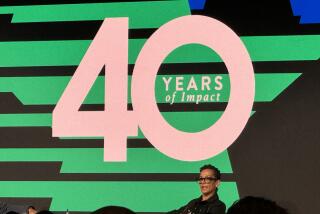Setting Kids Straight With a Paddle : Rowing: Bragg developed the renowned Ventura Olympic Canoe Club for youngsters through the sheer force of his energy.
- Share via
As founder and longtime coach of the perpetually impoverished Ventura Olympic Canoe Club, Billy Bragg has often been up a creek without a paddle . . . and a boat trailer, boat house, and even a canoe.
But Bragg, a teacher at Balboa Middle School in Ventura, is a wizard at building boats and equipment on the cheap and organizing paddle-a-thons and car washes to raise money. His yeoman efforts have preserved the VOCC, which has dominated youth canoeing in this country for nearly two decades.
Now, however, Bragg is facing a problem that may finally sink the club. “I’m running out of gas,” he says.
Bragg, 55, has been the club’s prime energy source since its unpretentious origin in the early ‘70s. Under his guidance, hundreds of kids have learned the sport, many going on to international competition. Two former club members, brothers Dave and Fred Spaulding, are on this year’s Olympic team.
“Bragg has done a great job of developing athletes,” says Steve Kelly, an executive with the American Canoe Assn., the governing body for the sport.
But the club is only a part of Bragg’s contribution to American Olympic canoeing and kayaking. A former national team head coach and international competitor--winning a gold medal at the 1967 Pan American Games--Bragg helped establish the sport in Southern California.
“He’s a pioneer,” Kelly says.
In the early 1960s, Easterners dominated canoeing and kayaking while West Coast athletes were into surfing and swimming. Bragg owned a surf shop in Hermosa Beach and raced paddleboards, some as long as 20 feet. After winning a race in Hawaii, he was approached by a stranger who told him to try kayaking.
“Until then, I had never seen a kayak,” says the strapping 6-foot-4 Bragg.
Bragg tried getting his friends interested in kayaking but none could afford a boat. Around 1962, Bragg’s friend Bill Jewell was given a kayak by his father and began working out in the South Bay. A year later, on a lark, Jewell decided to go to New York for the U.S. nationals. Amazingly, he won. “He came back here,” Bragg recalls, “and told us, ‘Those Eastern guys don’t know how to train.’ ”
Bragg saw the potential right away. Forget the East Coast. Southern California would be America’s new center of canoeing and kayaking. “I immediately jumped right into it,” Bragg says. For the rest of the ‘60s, Jewell, Bragg and their friends made a big splash in the sport. Although Bragg barely missed making Olympic teams--once by a tenth of a second--his friends Jewell, Tony Ralph and Walt Richards did, “much to the dismay of the Easterners,” Bragg says.
“All the West Coast guys were athletes,” he explains. “We’d paddle all year long. On the East Coast, they didn’t even start training until Easter. I paddled 150K a week and when I told the Easterners that, they didn’t believe me. ‘You mean, 150K a month?’ ”
A graduate of Cal State Long Beach, Bragg landed a job teaching math and physical education at Balboa in 1969. He moved to Newbury Park because it was between the ocean and the Westlake Village lake, “the best training place in all of Southern California,” he says. Bragg would train early in the morning at either the lake or the ocean, and Balboa students began noticing canoes and kayaks strapped to the top of his car.
“Four or five kids started asking me if they could try it,” he says.
By 1973, Bragg was training 20 kids before school daily, entering them in races on the weekends. “I generally got kids who were not into organized activities like soccer or Little League,” he says. “They were not the star athletes, but they had to be willing to stick it out on cold, wet mornings.”
When the budding canoeists heard that the ’73 U.S. National Sprint championships were going to be held in Seattle that summer, they persuaded a skeptical Bragg that they were ready. The problem was transporting the boats--you couldn’t put a 36-foot-long kayak atop a Chevy--but the kids’ parents enlisted Ventura College welding students and built a trailer dubbed “The Turkey Express.”
Bragg’s club didn’t just show up in Seattle. It won the nationals. “I was astounded,” Bragg says. But after that, national titles became almost routine. The VOCC won 10 of the next 14 championships, including six in a row from 1975-80. It slumped in the early ‘80s when Bragg was heavily involved with the U.S. national team, but snapped back with four consecutive titles beginning in 1984.
Not only did Bragg spend long hours with the club, but he traveled all over the country giving clinics and recruiting kids into the sport. He was also training canoeists who didn’t belong to the club--some of them came from as far away as New York, camping out in his back yard--and has sent eight pupils to the Olympics.
“This has been a completely do-it-yourself project,” he says. “I’m in a down cycle now.” Then he adds a ray of hope for would-be canoeists: “Who knows? Maybe I’ll get my enthusiasm back.”
More to Read
Go beyond the scoreboard
Get the latest on L.A.'s teams in the daily Sports Report newsletter.
You may occasionally receive promotional content from the Los Angeles Times.






